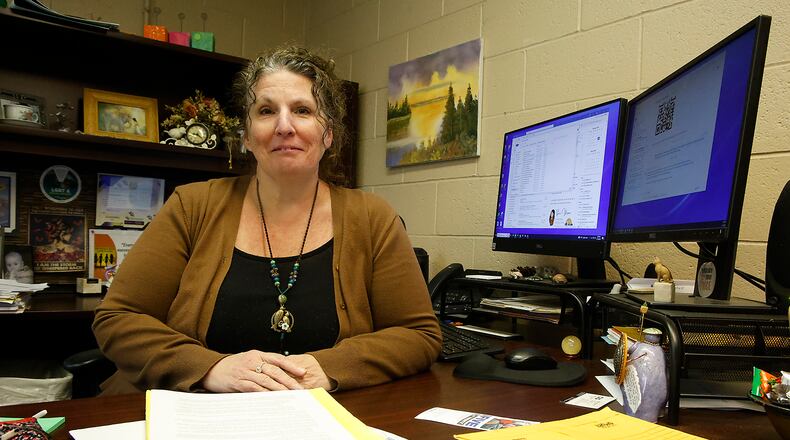“What it might look like in Hollywood is probably not what it looks like in Clark County, Ohio,” Baxter said.
Human trafficking is the compulsion or coercion of a person to perform labor or provide services, or engage in commercial sex acts, according to the U.S. Department of Justice. Any exploitation of a minor for commercial sex is defined as human trafficking.
The funding is part of the state’s Direct Services for Victims of Human Trafficking Grant Program, which “aims to help serve the growing number of sex and labor trafficking victims in need of support,” according to a release from Gov. Mike DeWine’s office.
“This new program will help ensure that human trafficking survivors in Ohio get the specialized support they need to help take back control of their lives,” DeWine said in the release.
The program funds services related to mental health, substance use disorder treatment, education and employment support and residential placement.
Nonprofits that provide direct support to victims of human trafficking and/or people considered at high risk of trafficking were eligible.
Baxter said Project Woman employs an evidence-based assessment to determine what kind of services and support a person who has experienced trafficking needs. This includes emotional and financial support, as well as more long-term shelter needs.
Project Woman plans to soon expand its shelter space with 12-16 more beds.
The grant will help the nonprofit and the organizations with which it works record more comprehensive data to show frequency and trends of human trafficking in Clark County, as well as common characteristics, Baxter said. Part of this is by funding the training of the coordinated response team, which includes other partners like law enforcement, the Child Advocacy Center and the county victim witness department.
Baxter said Project Woman’s main partner in the trafficking screening tool is Mercy Health – Springfield, and the organizations have been working together to form a response protocol. The Ohio Domestic Violence Network serves as a facilitator and trainer for the county’s local coordinated community response.
“We’re committed to doing it even if we weren’t funded; funding makes it a little more attainable,” Baxter said.
Counting and categorizing cases of human trafficking can be difficult, particularly because there are numerous cases of “poly-victimization,” Baxter said. This means that a person may meet the criteria for human trafficking but aren’t being identified as such due to other crimes of which they are victims, like intimate partner violence.
From June 2022 to June 2023, there were 11 cases of human trafficking recorded by Project Woman, Baxter said. She said the actual number was likely higher, but not all cases are reported or identified.
In Clark County, human trafficking is often part of a “family violence experience,” involving relatives or intimate partners, Baxter said.
Like all immigrant communities, the Haitian population faces increased risk factors for human trafficking, with people holding documents like passports over their heads to force them into trafficking, Baxter said. Undocumented immigrants face a higher risk.
The nonprofit recently hired a Haitian advocate who speaks Haitian Creole and Spanish, so it can help people who speak these languages and have different cultural experiences that are victims of trafficking, Baxter said. This will also allow Project Woman to determine the impacts the crime has on the community.
“It’s important that we understand the culture and the unique barriers that there would be to be reporting this gender-based violence,” Baxter said.
According to Project Woman’s application for the grant, survivors of human trafficking in the Haitian community have reported sexual coercion and exploitation by family members, intimate partners and people who have promised access to transportation, jobs and housing.
Thirty nonprofits in 14 counties in the state were awarded more than $4.6 million in grants to address human trafficking.
About the Author
